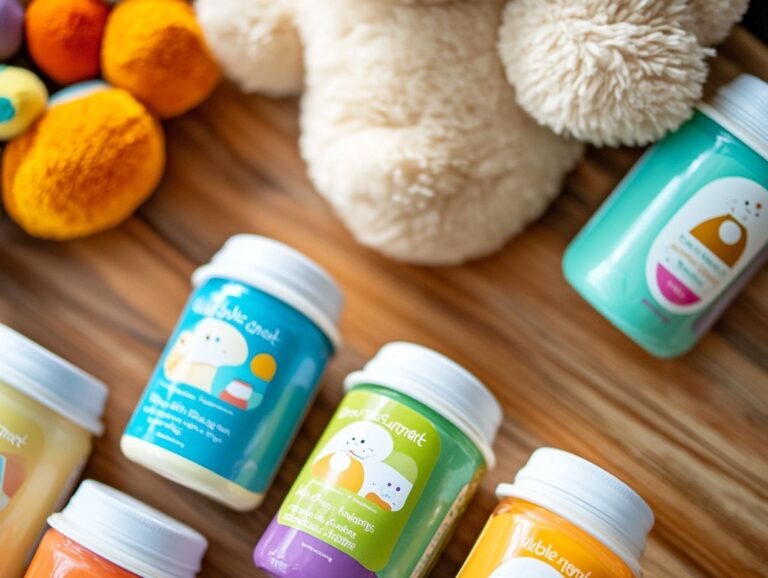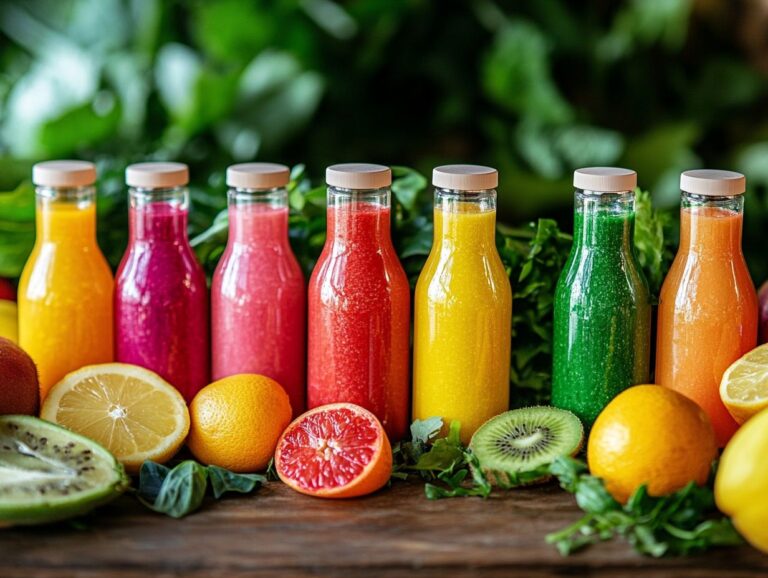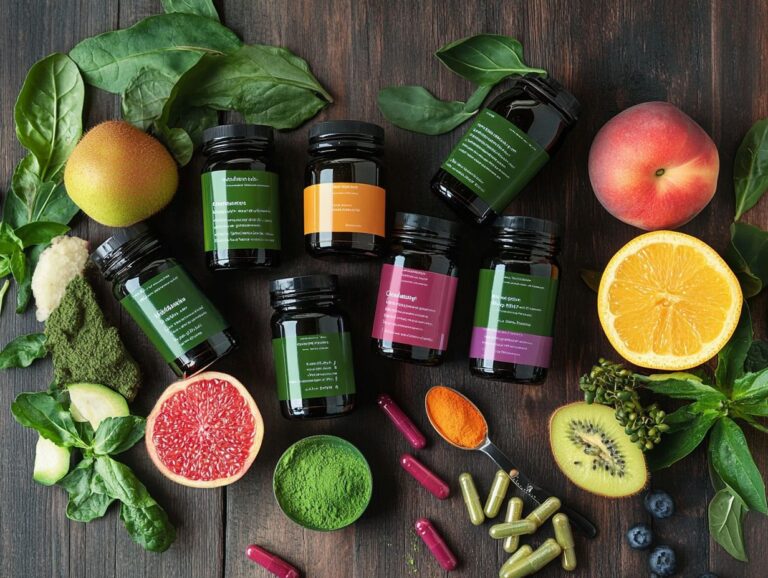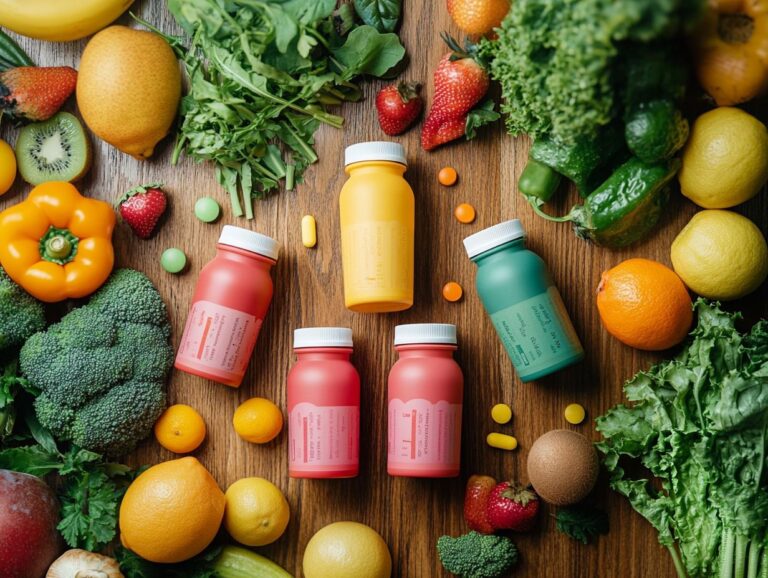In an increasingly health-conscious world, plant-based multivitamins have become a popular choice for individuals looking to enhance their nutritional intake without relying on animal-derived ingredients. These supplements not only provide essential vitamins and minerals but also align with a vegan lifestyle. This article explores the benefits of plant-based multivitamins, highlights key nutrients such as iodine, zinc, and selenium to consider, and recommends some of the best vegan multivitamins available. Additionally, it offers guidance on how to select the right multivitamin tailored to your unique dietary needs while addressing potential risks and side effects. Discover how you can nourish your body with nature’s best and ensure nutritional adequacy!
What Are Plant-Based Multivitamins?
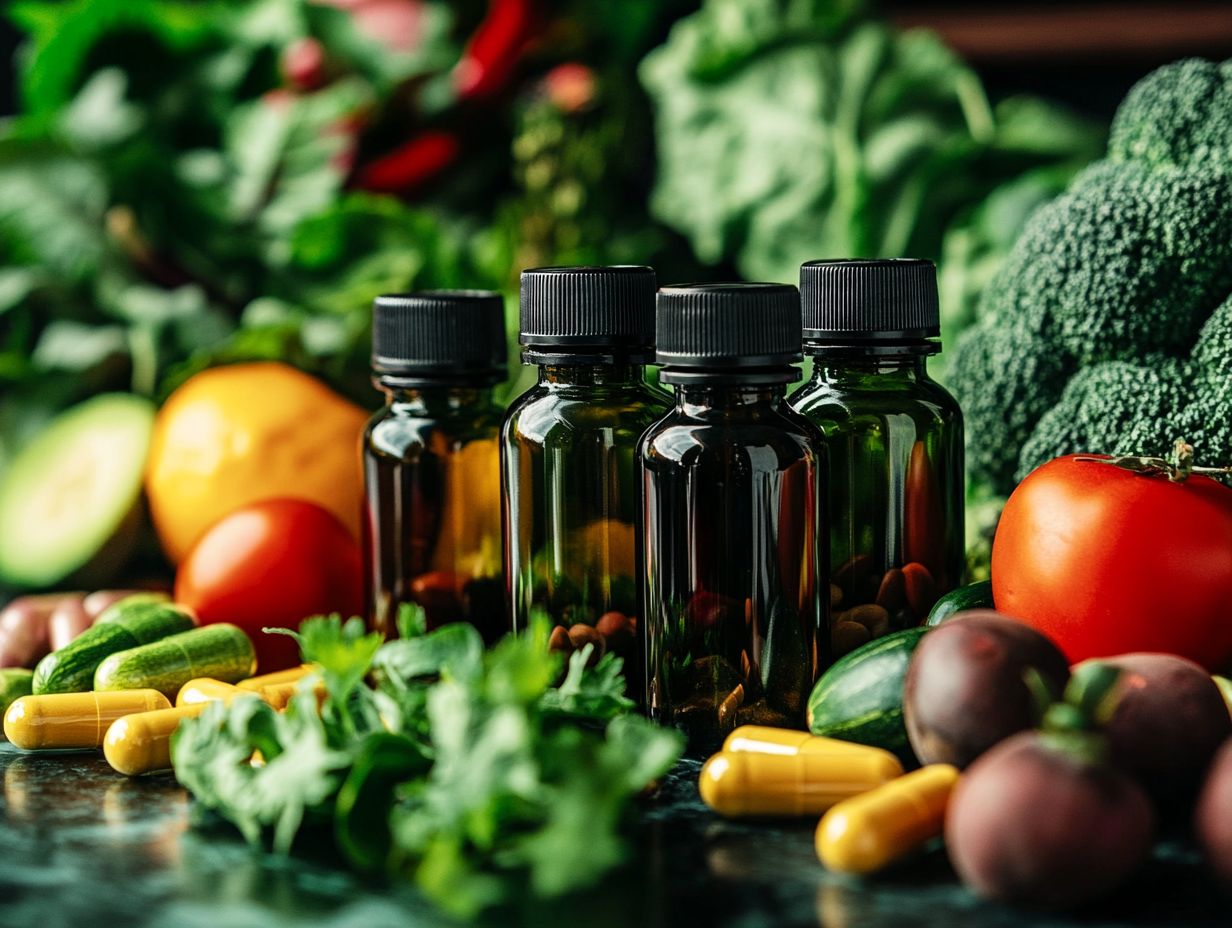
Plant-based multivitamins are dietary supplements that deliver essential vitamins and minerals in their natural, plant-derived forms. These multivitamins are specifically designed for individuals who follow a vegan diet or those seeking to obtain additional nutrients without consuming animal byproducts. With the help of registered dietitians, individuals can ensure that their dietary choices meet nutritional adequacy and fill any potential nutrient gaps.
Plant-based multivitamins aim to meet the specific health and nutritional needs of individuals looking to fill the gaps in their diets and ensure overall nutritional adequacy, especially in a nutrient-poor diet. By supplementing nutrients such as vitamin B12, vitamin D, and omega-3, these multivitamins support a healthy vegan lifestyle.
What Are The Benefits Of Plant-Based Multivitamins?
Plant-based multivitamins offer several benefits, including supporting optimal nutrient absorption, filling dietary gaps, and promoting overall health and wellness, particularly for individuals following a vegan diet.
These multivitamins are formulated to provide essential nutrients necessary for maintaining healthy energy levels, immune function, and overall well-being, especially for those who may struggle to obtain required nutrients through food alone. Whole food vitamins and individual supplements can offer additional support for optimal nutrient absorption and health benefits.
The ingredients in plant-based multivitamins can help address common dietary deficiencies, such as vitamin B12, iron, omega-3 fatty acids, iodine, and choline, all of which are crucial for the body’s proper functioning. These nutrients are vital in preventing nutrient deficiencies and supporting overall health.
Registered dietitians can assist individuals in understanding the role of plant-based multivitamins in meeting the daily reference intake (DRI), ensuring they receive the appropriate amounts of all necessary vitamins and minerals. Through independent testing and quality testing, consumers can rely on supplement recommendations from trusted sources such as the Academy of Nutrition and Dietetics or ConsumerLab.
By incorporating plant-based multivitamins into their diets, individuals can enhance digestion, improve mental clarity, and promote overall well-being, contributing to a healthier lifestyle both physically and mentally. This is particularly beneficial for plant-based families and vegan children, ensuring they receive essential nutrients from natural ingredients.
What Are The Key Nutrients To Look For In A Plant-Based Multivitamin?
When selecting a plant-based multivitamin, it’s essential to look for specific nutrients that support health and well-being, as these are often lacking in a vegan diet.
The most important nutrients to consider include:
- vitamin B12
- vitamin D
- iron
- calcium
- omega-3 fatty acids
- protein
- iodine
- zinc
- selenium
- choline
These key nutrients are vital for maintaining overall health and are frequently deficient in a vegan diet. Understanding the significance of these nutrients will aid you in choosing the best vegan multivitamins, like those offered by brands such as Solgar, Viridian, and Naturelo, which specialize in vegan supplements.
1. Vitamin B12
Vitamin B12 is a nutrient of particular concern for vegans, as it is primarily found in animal products, making supplementation essential for those following a plant-based diet.
Without adequate B12, individuals may experience memory loss, mood changes, and impaired cognitive function, highlighting the nutrient’s significant role beyond its effects on blood health.
The daily reference intake varies among adult populations, but most health organizations recommend a minimum of 2.4 micrograms per day to prevent deficiency. Therefore, vegans should actively seek high-quality sources of vitamin B12, such as sublingual tablets, fortified foods, or reputable supplements.
Consumer reviews often provide insights into the effectiveness of various brands and formulations, serving as a valuable resource for individuals aiming to meet their nutritional needs on a plant-based diet.
2. Vitamin D
Vitamin D is an essential nutrient that plays a significant role in bone health, immune function, and overall well-being. However, obtaining sufficient levels of this vitamin from a vegan diet alone can be challenging.
Since Vitamin D is synthesized through sun exposure, individuals with limited sunlight may need to consider supplementation to meet their dietary needs. For those following a vegan lifestyle, dietary sources of Vitamin D are quite limited.
While foods such as fortified plant-based milk, UV-exposed mushrooms, and yeast can provide some support, these options often do not meet the recommended levels. A deficiency in Vitamin D can directly affect calcium absorption, which is crucial for maintaining strong bones.
Therefore, incorporating a reliable Vitamin D supplement is vital for vegans. This supplementation can enhance overall nutrient absorption, helping to ensure that the body remains healthy and resilient, especially during winter months or in regions with limited sunlight.
3. Iron
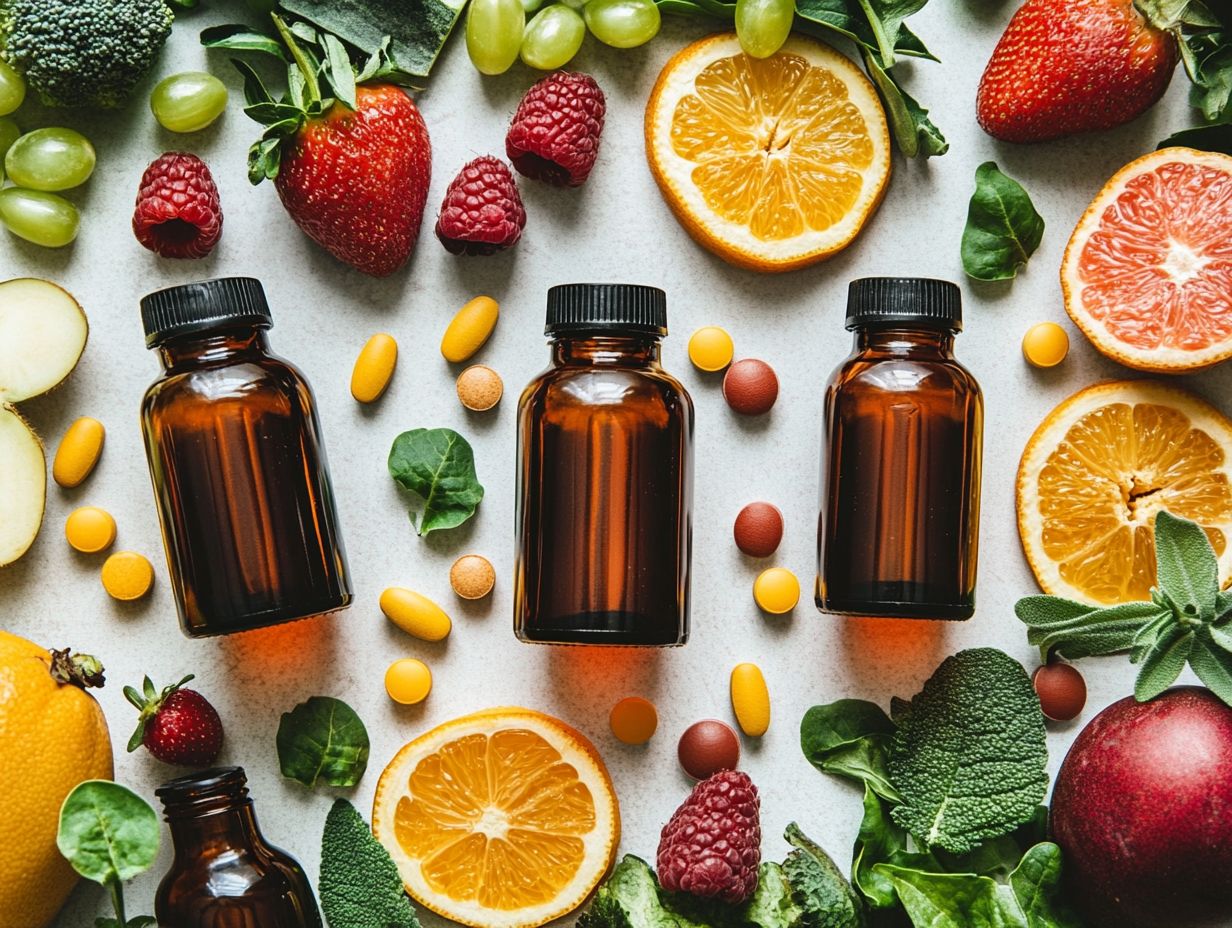
Iron is a mineral essential for the synthesis of hemoglobin in red blood cells. It poses a particular concern for those following a vegan diet, as plant-based sources of iron are less readily absorbed than those from animal sources.
Therefore, vegans should carefully monitor their iron levels and consider taking iron supplements if necessary. Understanding the difference between heme and non-heme iron is crucial; heme iron, found in animal products, has a higher absorption rate compared to non-heme iron, which is present in plant foods such as legumes and green leafy vegetables.
For individuals on a vegan diet, enhancing the absorption of non-heme iron may require consuming foods rich in vitamin C. While supplements can effectively address nutrient deficiencies, they should be used with caution and ideally under the supervision of a healthcare professional to prevent potential toxicity issues.
4. Calcium
Calcium is an essential mineral crucial for maintaining the strength of bones and teeth, and it holds particular importance for the elderly. This mineral is present in various plant-based foods, including dark green leafy vegetables, soy products, and fortified plant-based milks and juices.
However, individuals following a plant-based diet may need supplements to meet their daily calcium requirements and optimize bone health. Beyond its significance for bone and oral health, calcium plays vital roles in overall well-being, including muscle function, nerve transmission, and hormone secretion.
Those on a vegan diet may struggle to obtain sufficient calcium, especially if they avoid fortified foods or nut-based milks. Regular health check-ups can be beneficial for monitoring calcium levels, ensuring strong bones and reducing the risk of osteoporosis later in life.
For many individuals, supplements can effectively help meet their calcium needs.
5. Omega-3 Fatty Acids
Omega-3 fatty acids are essential fats that promote cardiovascular health, enhance brain function, and reduce inflammation. However, obtaining sufficient amounts of these fatty acids can be challenging on a vegan diet.
Vegan supplements derived from sources like algae can help individuals meet their dietary needs while promoting overall health. Choosing well-balanced supplements ensures that essential nutrients are absorbed effectively, supporting cardiovascular and neurological health. These vital fats play a significant role in heart health by reducing triglycerides and lowering blood pressure. Additionally, they are linked to improved cognitive function and may decrease the risk of developing neurodegenerative diseases.
While traditional sources like fish are rich in omega-3s, vegan alternatives provide a suitable option for those following plant-based lifestyles. Foods such as chia seeds, flaxseeds, and walnuts are excellent additions to a vegan diet, as they offer essential alpha-linolenic acid (ALA), a type of omega-3.
Incorporating these nutrient-rich foods not only meets dietary requirements but also enhances overall wellness and vitality.
What Are The Best Plant-Based Multivitamins?
Selecting the best plant-based multivitamins can be challenging due to the plethora of options available. Trusted brands like Garden of Life, Laveen, and Future Kind offer high-quality vegan multivitamins that cater to specific health needs and life stages. The top vegan multivitamins are high-quality products made from well-sourced ingredients and backed by positive consumer reviews.
When considering the best plant-based multivitamins for the whole family, it is important to choose those that are safe for both children and seniors. Additionally, options that are chewable or available in liquid form are ideal for individuals who have difficulty swallowing pills.
1. Garden of Life Vitamin Code Raw One for Women
Garden of Life Vitamin Code Raw One for Women is a comprehensive vegan multivitamin specifically designed to address the unique health needs of women, including those during pregnancy. It provides a robust blend of vitamins and minerals sourced from whole foods, emphasizing women’s health by including essential nutrients such as iron, folate, and calcium to support energy levels and bone health.
Along with these vital components, the formula features probiotics and enzymes that promote digestive health, ensuring effective nutrient absorption. Users frequently report that this multivitamin contributes to enhanced vitality and overall well-being.
With rigorous quality testing and independent testing, it guarantees that each ingredient is vegan-certified and free from synthetic binders or fillers, making it a trusted choice for health-conscious individuals. Overall consumer satisfaction reflects the product’s effectiveness, leading many to recommend it as a daily supplement tailored specifically to women’s holistic health requirements.
2. Deva Vegan Multivitamin
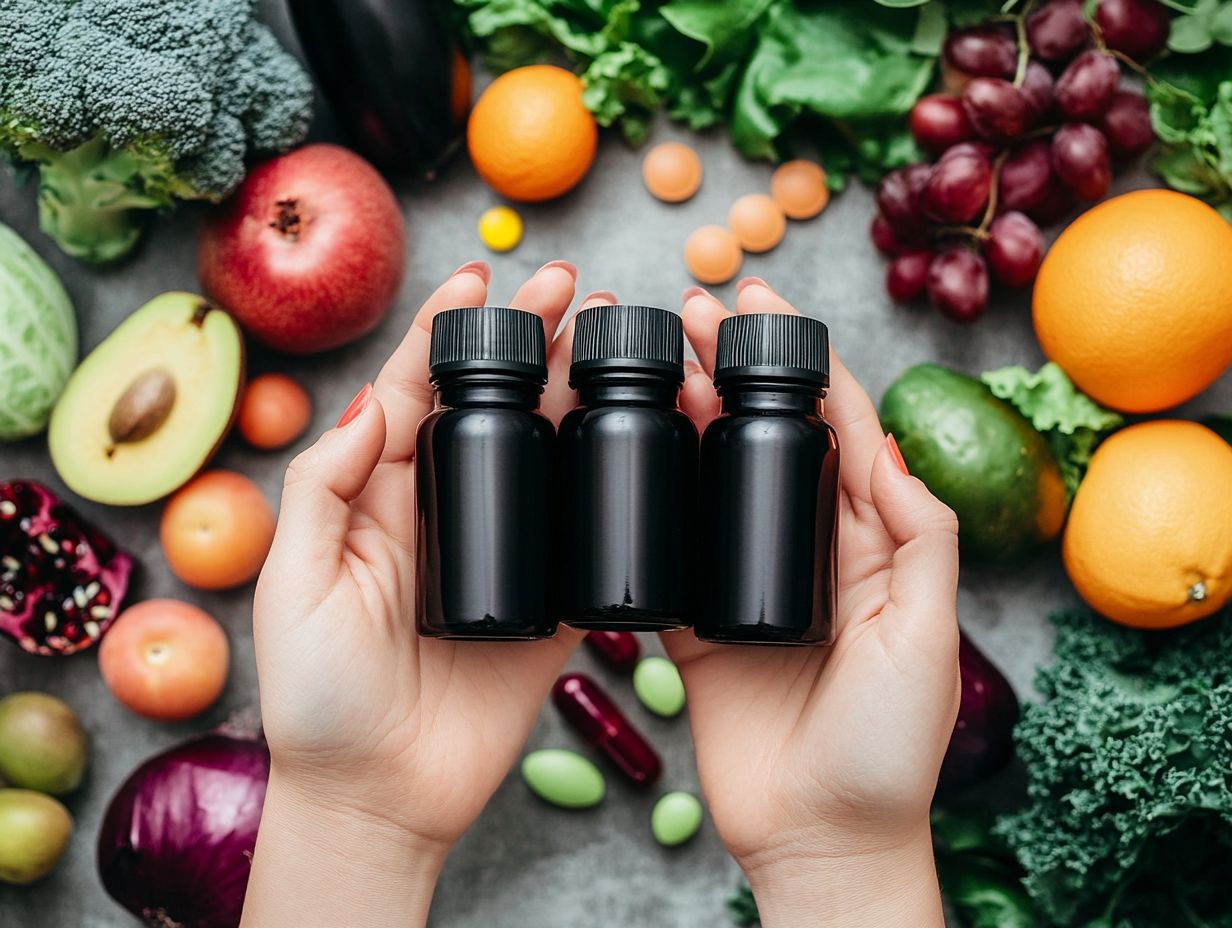
Deva Vegan Multivitamin is a comprehensive supplement featuring a diverse range of ingredients that provide essential vitamins and minerals like vitamin B12, iron, and calcium, making it a popular choice for vegans seeking to enhance their nutrient-rich diets.
Formulated with high-quality components, this multivitamin is designed to address common nutrient gaps found in vegan diets. Its unique formulation carefully selects essential nutrients that specifically support a vegan lifestyle, particularly for individuals who may struggle to obtain adequate amounts of vitamin B12, iron, and calcium from their whole food sources.
The product has undergone rigorous quality testing for purity and efficacy and boasts third-party certifications that confirm its suitability for various dietary needs. Therefore, while it is tailored for vegans, it also benefits anyone looking to improve their overall health and well-being.
Each capsule contains a balanced blend that promotes energy, immune support, and overall health.
3. MegaFood Women’s One Daily
MegaFood Women’s One Daily is a plant-based multivitamin designed specifically for women’s health and wellness. These high-quality multivitamins promote optimal well-being and energy levels by providing all the essential vitamins and minerals women need, including vitamin D and choline, from whole food sources.
Enriched with a blend of natural ingredients such as organic kale and broccoli, this formulation supports immunity and enhances skin health, helping women feel their best. Additionally, the inclusion of B vitamins and selenium aids in stress management and supports metabolism, making it one of the best vegan multivitamins on the market.
Positive consumer reviews highlight its effectiveness and digestibility, confirming that it is a reliable supplement that seamlessly fits into a busy lifestyle, boosting vitality and promoting balanced health for women through natural ingredients.
4. Naturelo Whole Food Multivitamin for Women
Naturelo Whole Food Multivitamin for Women is a vegan multivitamin crafted from natural ingredients, providing a balanced blend of essential nutrients tailored to address women’s specific health needs. This multivitamin ensures that users receive key vitamins and minerals like iodine and zinc sourced from whole foods, promoting overall health and well-being.
It incorporates carefully selected botanical extracts to help meet daily nutritional requirements, and it emphasizes rigorous quality testing to guarantee potency and purity. Designed for individuals following a vegan diet, it caters to their specific dietary needs and preferences, making it suitable for plant-based families.
Key ingredients include organic fruits and vegetables, along with added probiotics for digestive support, making it an excellent choice for women seeking to enhance their energy levels and bolster their immune systems.
Therefore, Naturelo Whole Food Multivitamin for Women is a strong option for anyone looking to improve their health with natural ingredients.
5. New Chapter Every Woman’s One Daily
New Chapter Every Woman’s One Daily is a vegan multivitamin specifically designed to support women’s health, offering a powerful combination of vitamins and minerals derived from whole foods. This multivitamin brand recognizes the importance of utilizing healthful ingredients to enhance absorption and effectiveness.
A distinctive feature that sets this multivitamin apart in a competitive market is its inclusion of fermented probiotics, ginger, and organic herbs as essential components that together promote overall wellness.
The incorporation of these premium ingredients contributes to improved energy levels and supports digestive health, an area often overlooked in many vitamin supplements. Consumer reviews frequently highlight noticeable enhancements in daily energy and mood stabilization while using this multivitamin, aligning with the best vegan supplements available.
New Chapter Every Woman’s One Daily provides clean, plant-based nutrition tailored to address the unique health concerns women encounter at various stages of life.
How To Choose The Right Plant-Based Multivitamin For You?
Selecting the right plant-based multivitamin can significantly impact health and well-being. It is essential to choose a multivitamin that aligns with your dietary restrictions and nutritional needs, making the selection of one with appropriate ingredients, nutrient profiles, and certifications even more important.
1. Consider Your Dietary Restrictions
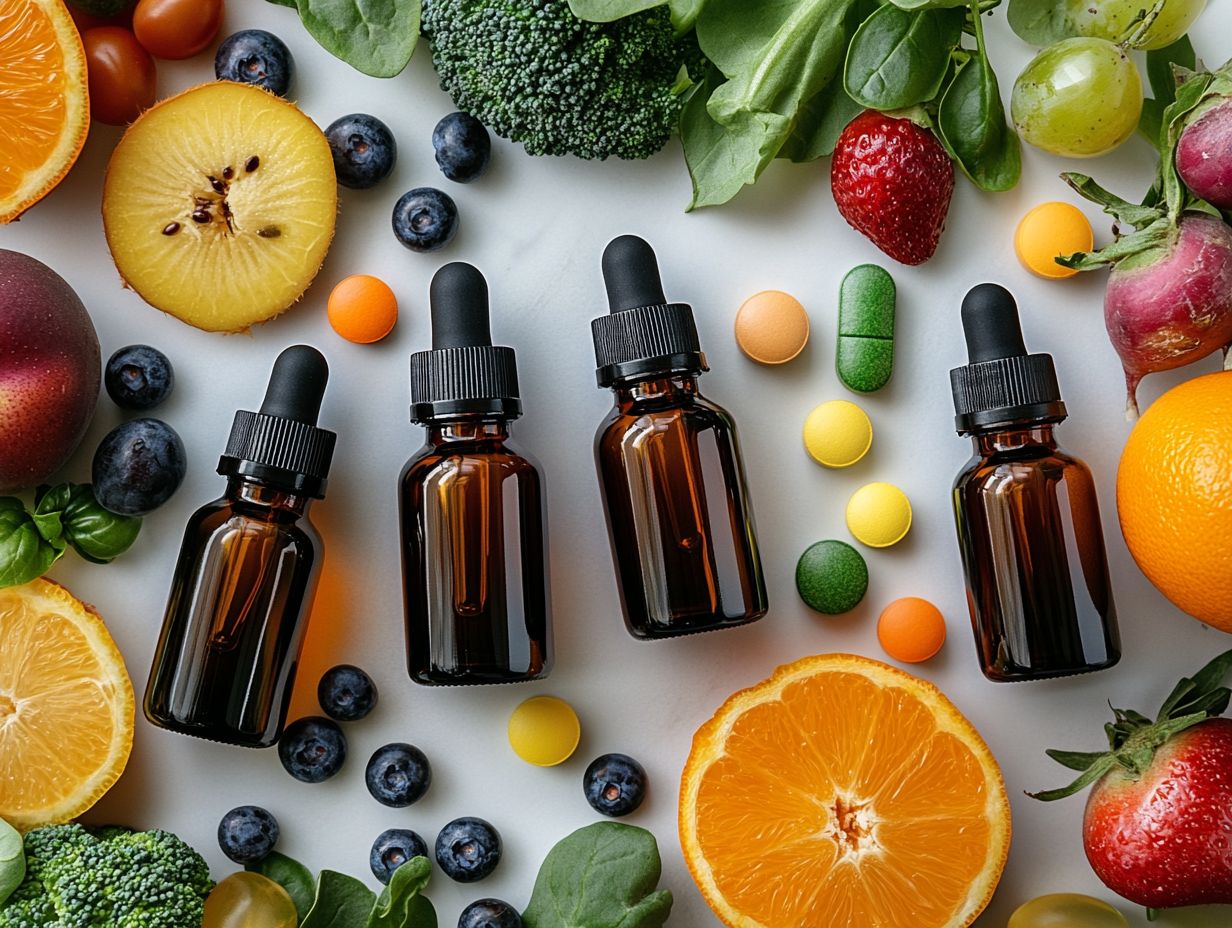
When selecting a plant-based multivitamin, one of the key considerations is dietary restrictions, as individuals’ needs may vary based on allergies, intolerances, or specific health conditions. This ensures that the chosen supplements, such as those by Solgar and Garden of Life, are safe and beneficial for each person’s unique situation.
Another important factor is understanding which nutrients are likely to be deficient in a vegan diet. Certain vitamins and minerals, such as Vitamin B12, iron, and omega-3 fatty acids, are less prevalent in plant foods. Individuals should assess their intake by tracking their diet or consulting with healthcare professionals to determine their supplementation needs.
Additionally, the source of ingredients in multivitamins is crucial, as some may contain animal-derived forms that do not align with a vegan lifestyle. Selecting multivitamins tailored to meet these specific dietary criteria is essential for achieving optimal nutritional balance.
2. Check The Ingredients List
Checking the ingredient list of a plant-based multivitamin is essential, as it reveals the quality and sources of the nutrients included, both of which are crucial for ensuring the multivitamin’s effectiveness and safety.
A properly formulated multivitamin should contain natural ingredients that support nutrient absorption and provide health benefits.
When evaluating these products, it is important to distinguish between natural and synthetic ingredients. Natural ingredients are derived from whole food sources, offering more balanced and bioavailable forms of nutrients. In contrast, synthetic additives and fillers can diminish overall quality and may lead to reduced absorption and negative side effects.
It is advisable to choose multivitamins from manufacturers that are transparent and subject their products to rigorous quality testing, ensuring they meet appropriate health standards. Additionally, multivitamins high in artificial colorings, preservatives, or other unnecessary chemicals should be avoided, as these can negate the positive health benefits and potentially harm overall wellness.
3. Look For Third-Party Certifications
When selecting a plant-based multivitamin, looking for third-party certifications can help assure consumers of the product’s quality, safety, and efficacy.
Certifications from reputable organizations indicate that the multivitamins have undergone rigorous quality testing and meet specific industry standards. These certifications not only demonstrate a commitment to transparency but also instill confidence in the health benefits associated with the product.
When consumers see an independent testing seal, they can trust that the ingredients have been verified for potency and purity, thereby reducing the risk of contamination or misleading claims. Such endorsements enable consumers to make informed decisions, ensuring that they are investing in their health with a product that adheres to stringent guidelines.
Ultimately, third-party certifications can enhance consumer confidence, encouraging individuals to adopt healthier lifestyles with peace of mind.
4. Consider Your Age And Gender
Selecting a plant-based multivitamin tailored to your age and gender is crucial, as nutritional needs can vary significantly depending on life stage and gender.
By choosing a multivitamin that aligns with these specific requirements, you can ensure that your nutritional needs are adequately met.
For instance, adolescent girls may require multivitamins that are rich in iron and calcium to support menstruation and bone growth. In contrast, older men might need higher levels of vitamin D and vitamin B12 to promote energy and heart health, which can be found in individual supplements.
Pregnant women often need specialized prenatal vitamins that include folic acid, while seniors may benefit more from multivitamins designed to support joint and cognitive health.
Are There Any Risks Or Side Effects Of Taking Plant-Based Multivitamins?
Plant-based multivitamins provide numerous health benefits, including supplementing nutrients like folate and omega-3; however, consumers should also be aware of the potential risks and side effects associated with their use.
An overdose of certain vitamins and minerals, especially when combined with a nutrient-poor diet, can lead to negative health consequences. Therefore, it is essential to adhere to the recommended dosages.
1. Risk Of Overdose
The most significant risk associated with plant-based multivitamins is the potential for overdose, particularly with fat-soluble vitamins A, D, E, and K, which can accumulate in the body and lead to toxicity. This highlights the importance of responsible use and the necessity of consulting with a healthcare professional when appropriate.
When individuals take too many vitamins, they may experience negative symptoms such as nausea, dizziness, and headaches, which can impact daily functioning and raise concerns about long-term health risks. Over time, this unregulated intake can lead to complications such as liver damage or compromised bone health, emphasizing that the pursuit of optimal nutrition should be accompanied by consultation with a registered dietitian or nutrition professional.
Therefore, it is crucial for anyone considering the use of multivitamins to stay informed about their options and to understand that in the realm of health supplements, more does not always mean better.
2. Potential Interactions With Medications
Some plant-based multivitamins can interact with medications, posing health risks or diminishing the effectiveness of prescribed treatments. Therefore, it is essential for individuals to discuss these concerns with their healthcare provider before beginning any new supplement regimen, especially if they are currently taking medication.
This is particularly important as some botanicals can alter the metabolism of certain drugs, potentially increasing their toxicity or reducing their efficacy.
For instance, individuals on anticoagulants should be cautious, as garlic and ginkgo biloba supplements may affect blood clotting. Similarly, those on antidepressants may experience increased side effects or interference with the drug’s efficacy from certain herbal supplements.
Consequently, consulting with a healthcare professional is crucial for safely navigating these complex interactions and ensuring optimal health outcomes.
3. Allergic Reactions
Allergic reactions to ingredients in plant-based multivitamins can occur, especially in individuals who are sensitive to certain natural compounds or fillers used in these supplements. It is essential for consumers to read labels carefully and consult with a healthcare provider if they have a history of allergies.
Common allergens found in vegan supplements include soy, nuts, gluten, and various preservatives, which may trigger unwanted reactions in sensitive individuals.
To minimize the risk of allergies, it is advisable to choose supplements that are specifically labeled as hypoallergenic or free from known irritants. Thoroughly reading ingredient lists and selecting products with fewer, more recognizable components can also help in making safer dietary choices.
Additionally, consulting a registered dietitian or nutritionist who is familiar with vegan ingredients can assist in navigating the numerous options available while ensuring that one’s nutrition remains balanced and free from allergens.


